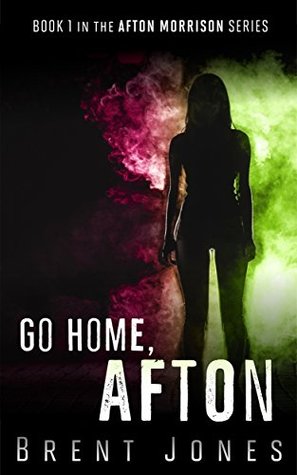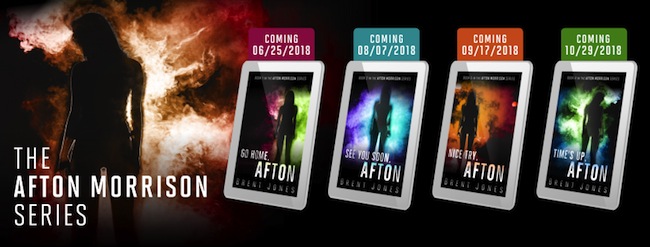 Go Home, Afton
Brent Jones
Go Home, Afton
Brent Jones
(Afton Morrison, #1)
Publication date: June 25th 2018
Genres: Adult, Thriller
We all wear masks, and Afton Morrison is no exception.
A small-town librarian with a dark side, Afton, twenty-six, has suppressed violent impulses her entire adult life. Impulses that demand she commit murder.
Blending her urges with reason, Afton stalks a known sexual predator, intending to kill him. But her plan, inspired by true crime and hatched with meticulous care, is interrupted by a mysterious figure from her past. A dangerous man that lurks in the shadows, watching, threatening to turn the huntress into the hunted.
Go Home, Afton is the first of four parts in a new serial thriller by author Brent Jones. Packed with grit and action, The Afton Morrison Series delves into a world of moral ambiguity, delivering audiences an unlikely heroine in the form of a disturbed vigilante murderess.
—
EXCERPT:
Parents—stay-at-home moms, mostly—brought in their toddlers once a week so I could read them a story. And I use the word toddlers loosely. Kids as old as six or seven sometimes attended during the summer. And the stories we would read were made up of fewer than fifty words, for the most part. A lot of the mothers in Wakefield were too lazy to read to their own children, I guess.
Oh, and crafts, too. After reading a story together, we’d break out glitter and colored pencils and paste and other nonsense, but that wasn’t the real reason a dozen women turned out with their little monsters each week. Storytime was an excuse for the mothers to gather and gossip. It always took a little while to get the children to settle down, sure. I’d press my finger to my lips and wait. Five or ten seconds at most, although I would have been happy to wait longer. Their mothers, on the other hand, were so much worse. Getting them to shut their fucking traps was a whole separate exercise in endurance.
But as much as I disliked children, there was something magical about them. It was their inability to see gray, I think. Their entire worlds existed in black and white, right and wrong, good and evil. You could see it in their faces as a story unfolded, rife with nervous energy at every inconsequential turn.
“And she just doesn’t know”—I read to the room, pointing to each gigantic word—“should she stay, should she go?”
I caught a boy’s expression, who sat just inches from me. The hippopotamus in our story was faced with a dilemma, and this boy was transfixed. His eyes were wide, his hands were cupped over his mouth, and he was vibrating with anticipation to see what the hippo would do next.
I flipped to the last page. “But yes the hippopotamus.”
The boy relaxed a little, making a deliberate show of letting his shoulders drop. A talented drama queen in the making. He was new to storytime and looked to be about five or six years old. He had dark hair, a tan complexion, and a missing front tooth. He’d attended just once before and he’d sat close that day, as well. I’d never really been big on learning children’s names, to be honest, but I knew his was Neil only because he’d come to the library alone both times. It sounds strange, I’m sure, but having a parent use the library as a free babysitting service happens more often than most people would guess.
I continued on, reading the final words of the story. “But not the armadillo.”
Neil was stressed all over again, and his tiny hand shot up. “Miss Afton?”
“Yes, ah, Neil? What is it, little man?”
“How come not the arma-darma?”
“Armadillo.” A woman in baggy gray sweatpants corrected him from the back of the room. She was a few years older than me, had bleach-blonde hair in a ponytail, and her voice resembled a seagull getting crushed by a car.
I shut the book and set it on my lap. “That’s a good question, Neil.” I bit my lower lip, deciding how much to share. “Well, let’s see. Ah, no one likes armadillos, for starters. They’re bullet-proof, if you can believe it, and ugly as sin. They carry leprosy, too, but they don’t bite children too often.”
The woman at the back of the room—Sweatpants, let’s call her—looked horrified. Her stained teeth chattered and she blinked in rapid succession. She placed her palms over her daughter’s ears, a girl around three or four in age.
Neil scratched his head. “What’s a lepra-she?”
“It’s—”
Sweatpants raised her hand to silence me—not that I minded—and looked to a few of the other mothers in the room for support, most of whom were checked out or occupied with their phones. She looked back at me again, then at her daughter. “It’s when good little boys and girls get ice cream.” That wasn’t how I might have defined the word, however. “You want to stop for ice cream on the way home, Jessi?”
It was hard enough getting these little turds to sit still for all fourteen pages of But Not the Hippopotamus. Why on earth would this woman want to stuff her daughter’s face with sugar before lunch? But the girl jumped up and squealed at the mention of sweets, and soon, other kids joined in, as did their mothers.
I peeked down at Neil to see him cradling his head in his hands, masking a look of disappointment by staring at the floor. It appeared he had forgotten all about armadillos and leprosy and storytime, and now sulked, wishing he had a parent present to take him for ice cream like the other children.
The mothers talked amongst themselves, and their toddlers fed on the elevated energy levels. The room was alive with discourse, and I wondered if the local Dairy Queen might consider paying me a small commission. “Well, that’s it for storytime, boys and girls. Thanks for coming.”
Sweatpants spoke up at the back of the room, the self-elected leader of Wakefield’s fattest and frumpiest. “But it’s only quarter past, Afton. Isn’t storytime supposed to be a full hour?”
“Just figured you were all on your way to get a double-scoop of leprosy.”
“Very funny.”
I raised my hands in a gesture of mock uncertainty. “We’ve got crafts we can do.” I pointed to three short tables covered in plastic, adorned with supplies that Kim had set up for us. “Should we get to it?”
“That won’t take long. Couldn’t you read them another story first?”
Couldn’t I read them another story? It’d been her idea to squeeze out one of these little nightmares. Why was I being punished for it? “Not this week, I’m afraid. Sorry.”
But she just wouldn’t give up. “Afton, do you know where Jessi’s daddy is right now?”
My first thought was that her husband was probably fucking her sister at some roadside motel with hourly rates, bed bugs, and a one-star rating on Trip Advisor. I couldn’t say that out loud, of course, and so I fought like hell to keep a smirk off my face. It helped to keep my sights trained on Jessi, who had sat back down, cross-legged in a checkered dress. She was drawing on the floor with one small finger.
Sweatpants answered her own question. “He’s at work, Afton. And he works hard, by the way, and we pay more than our share of taxes in this town. Taxes that pay your salary.”
Oh, the salary card. How I loved it when disgruntled parents brought up my salary, as if any one of them wanted to trade places with me. Yes, her taxes paid me a small fortune. That’s why I rented a one-bedroom apartment in a triplex. And it’s the same reason I drove a seven-year-old Corolla. I was so grateful—indebted, even—to Sweatpants and her husband that I just couldn’t wait to read another story.
“Sure thing.” I grabbed a second book off the pile next to me. “One more story, coming right up.”
Sweatpants smiled. It was a flat, fake smile, of course, the kind where the mouth curls tight but the eyes are dormant. It was about the best I could have hoped for, and it seemed to have a calming effect on the other mothers. They quieted down, eager to return to their various text message conversations.
I pointed my finger to more jumbo text on a colorful page. A story about an overweight and diabetic caterpillar with impulse control issues, who was always so very very fucking hungry. “In the light of the moon, a little egg lay on a leaf . . .”
And I couldn’t help but lose myself in thought. I was that little egg on a leaf, glimmering in the moonlight, and about to hatch. Soon after, the morning would come. And my hunger would be satiated at last, because Kenneth Pritchard would be dead.

Author Bio:
From bad checks to bathroom graffiti, Brent Jones has always been drawn to writing. He won a national creative writing competition at the age of fourteen, although he can’t recall what the story was about. Seventeen years later, he gave up his career to pursue creative writing full-time.
Jones writes from his home in Fort Erie, Canada. He’s happily married, a bearded cyclist, a mediocre guitarist, and the proud owner of two dogs with a God complex.









































